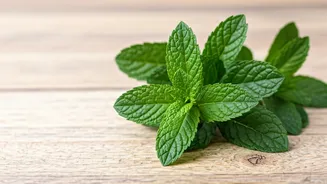Tea Tree Oil's Power
Tea tree oil, derived from the Melaleuca alternifolia tree, has long been employed as a natural remedy for skin conditions. Its potent antimicrobial and
anti-inflammatory characteristics make it a viable option for combating acne. When applied topically, tea tree oil can help reduce the bacteria that contribute to acne outbreaks, and soothe the inflammation that often accompanies pimples. It's often used diluted, mixed with a carrier oil like jojoba or coconut oil, to prevent potential skin irritation. For best results, use tea tree oil cautiously and follow the directions to lessen adverse effects. Always perform a patch test before regular application to check for any allergic responses. Tea tree oil offers a natural approach to manage acne by directly targeting the microorganisms and easing the irritation that cause acne to persist.
Spearmint Tea's Effects
Spearmint tea is another natural remedy that has garnered attention for its potential benefits in managing hormonal acne. Unlike tea tree oil, the effect of spearmint tea works primarily from within the body, influencing hormone levels. Research suggests that spearmint tea possesses anti-androgen properties, which means it can help reduce the levels of androgens like testosterone in the body. Elevated levels of androgens are often linked to hormonal imbalances that can trigger acne. By lowering these levels, spearmint tea may help reduce sebum production, a key factor in acne development. Drinking two cups of spearmint tea a day is a common recommendation, although individual responses can vary. As with any herbal remedy, it's wise to consult with a healthcare professional before including spearmint tea in your routine to ensure it aligns with your overall health needs and does not interfere with any existing medications or conditions.
Green Tea's Potential
Green tea is packed with antioxidants, and has shown promise in managing various skin conditions, including acne. The antioxidants in green tea, particularly epigallocatechin gallate (EGCG), work to reduce inflammation and protect the skin from damage caused by free radicals. For acne, these properties can help decrease redness and swelling associated with breakouts. Green tea can be consumed as a beverage, and it can also be used topically. Applying diluted green tea to the skin, either as a toner or in a face mask, may provide direct anti-inflammatory and antioxidant benefits. The use of green tea can vary. Some find drinking several cups daily beneficial, while others see improvement from topical applications. The combination of internal consumption and external use can further enhance the effects. However, results can differ, and consistent use is key for achieving visible improvements. Also, be aware of any sensitivities to caffeine or other compounds in green tea.
Omega-3 Fatty Acids
Omega-3 fatty acids, primarily found in fish oil, flaxseed, and chia seeds, play a vital role in maintaining overall health and have a positive impact on skin health. These fatty acids possess anti-inflammatory properties that can help reduce inflammation throughout the body, including the skin. In the context of acne, this anti-inflammatory action can help reduce the redness and swelling associated with acne lesions. Regular intake of omega-3s can also enhance the skin's moisture barrier, leading to healthier skin. Supplements are available, but omega-3s can also be incorporated through dietary changes, such as eating more fatty fish like salmon or adding flaxseed oil to meals. The suggested daily intake may vary depending on individual requirements and health goals, so consulting with a healthcare professional is advisable. A balanced diet and lifestyle, along with omega-3 fatty acids, can support overall skin health.
Zinc Supplementation
Zinc is an essential mineral that has been researched for its potential to improve acne symptoms. Zinc has anti-inflammatory properties and may help regulate hormone levels, both of which are significant factors in acne development. It is also involved in the process of wound healing, which can help repair skin affected by acne. Zinc supplements are available, but it is important to take them under medical guidance. Overconsumption can lead to side effects. For optimal use, a healthcare provider can advise on the appropriate dosage. Combining zinc supplementation with other remedies like topical treatments can produce better outcomes, but consistency is key. Zinc works by targeting the inflammation and the hormonal imbalances often associated with acne, thus offering potential benefits in the treatment of acne.
Aloe Vera's Benefits
Aloe vera is well-regarded for its soothing and healing qualities, making it a popular natural remedy for various skin conditions, including acne. The gel extracted from the aloe vera plant contains compounds with anti-inflammatory and antibacterial properties, which can help to reduce redness, swelling, and bacterial infection. When applied topically, aloe vera can help moisturize the skin while also promoting the healing of acne lesions. It may also prevent the formation of acne scars by stimulating collagen production. Aloe vera can be used in several forms, from pure gel extracted directly from the plant to commercially available products. Regular, careful use of aloe vera can offer a natural approach to healing acne-prone skin, providing relief and promoting healthier skin.













